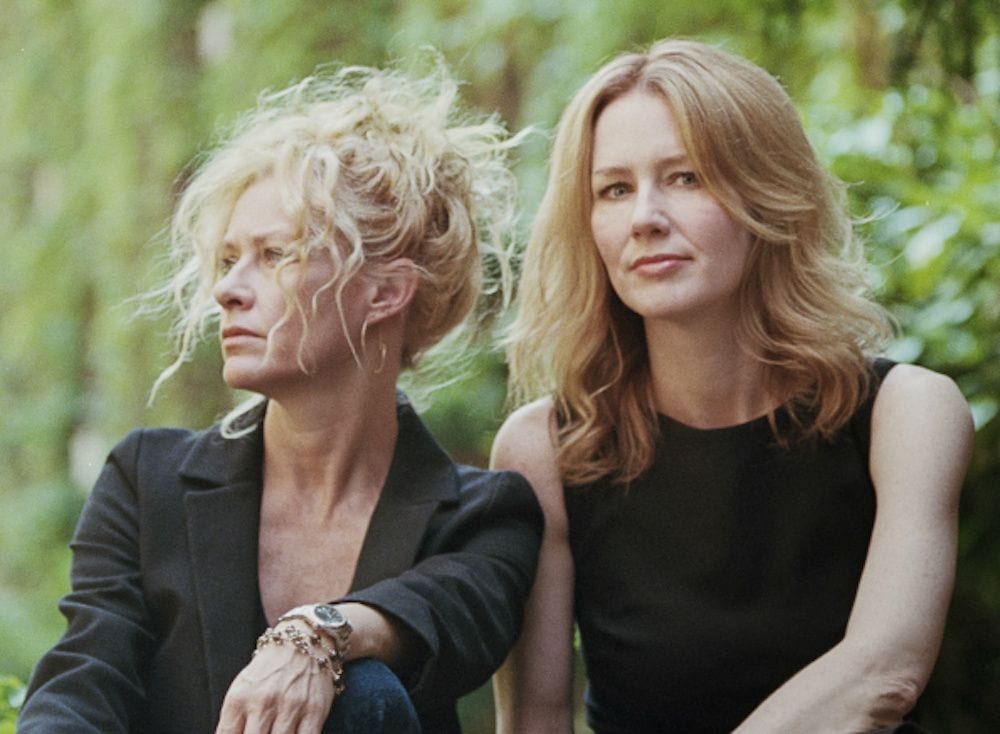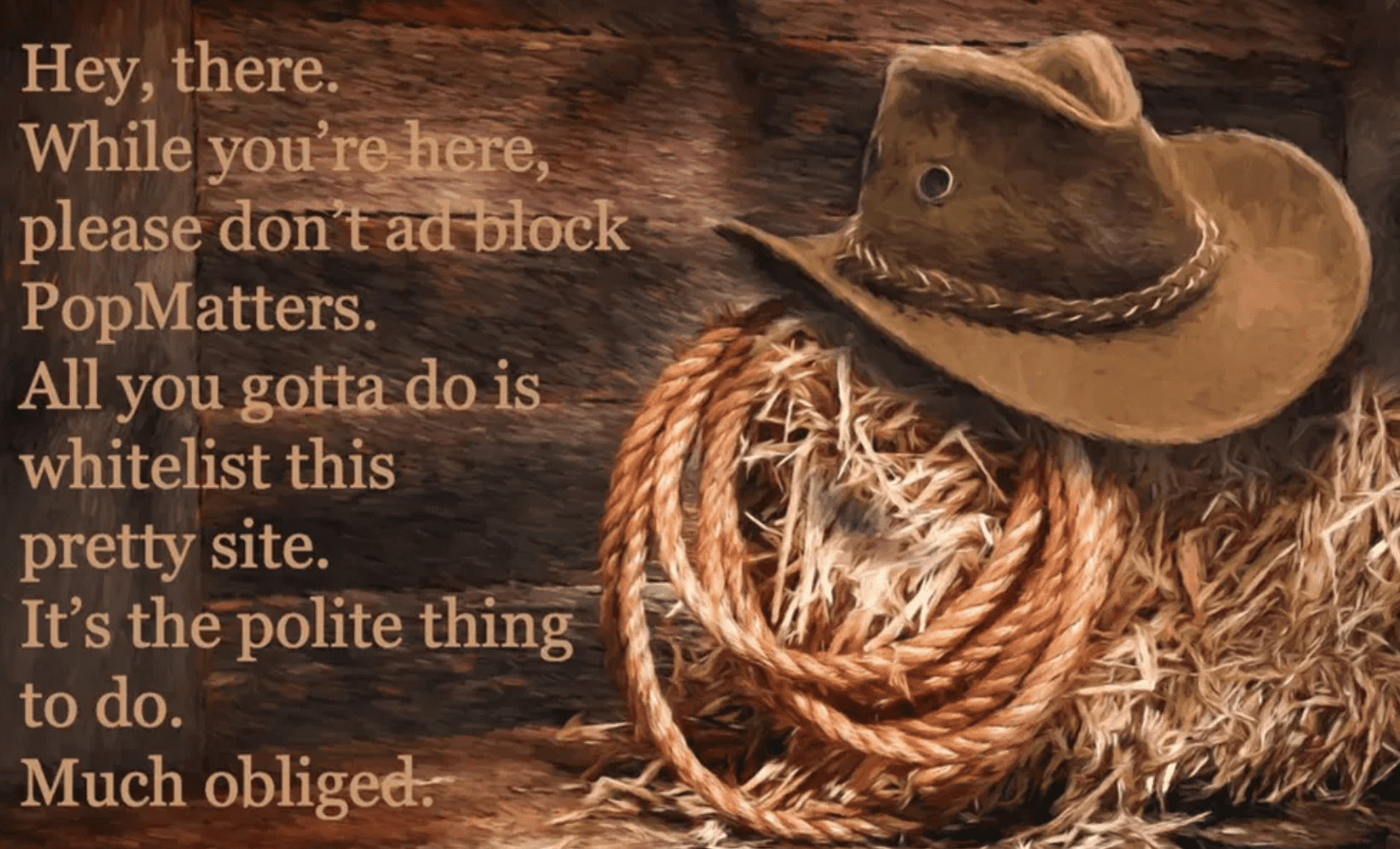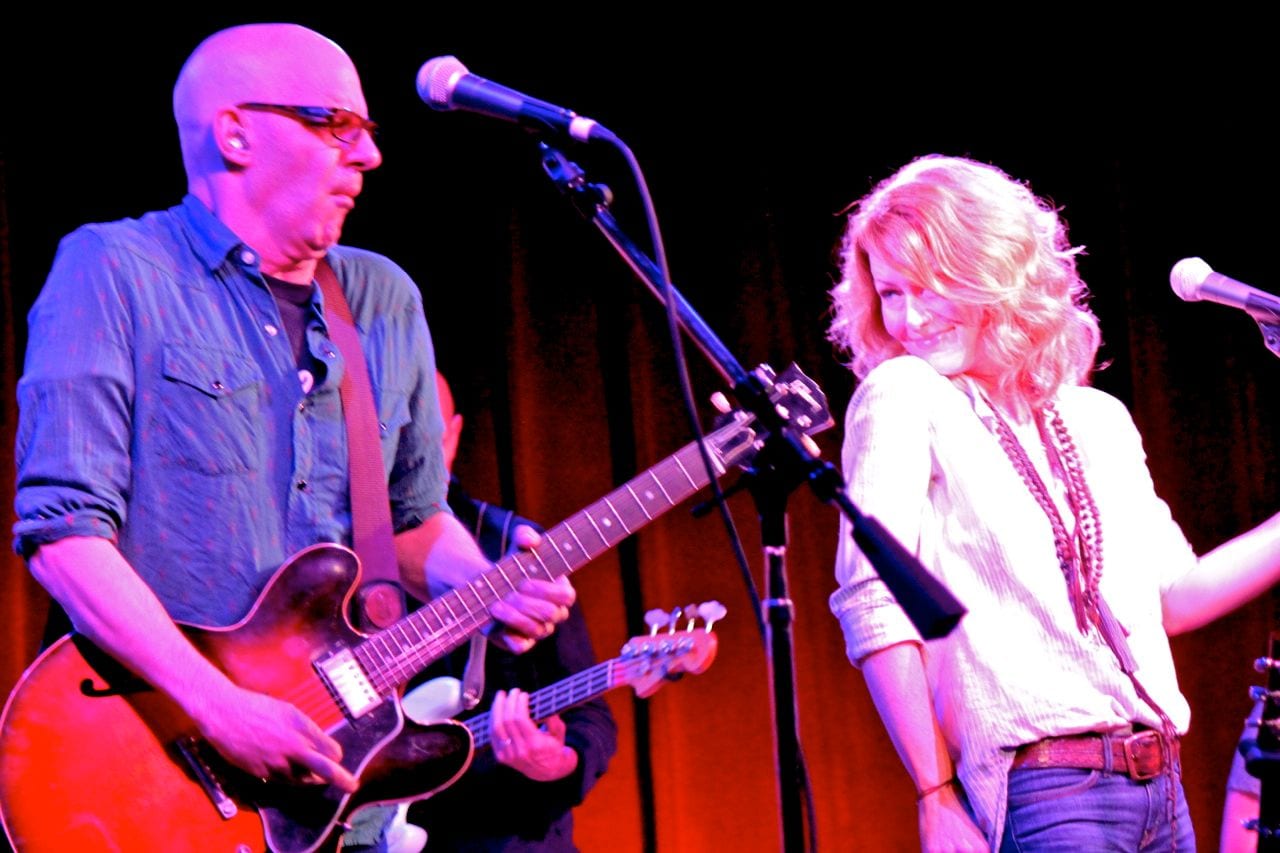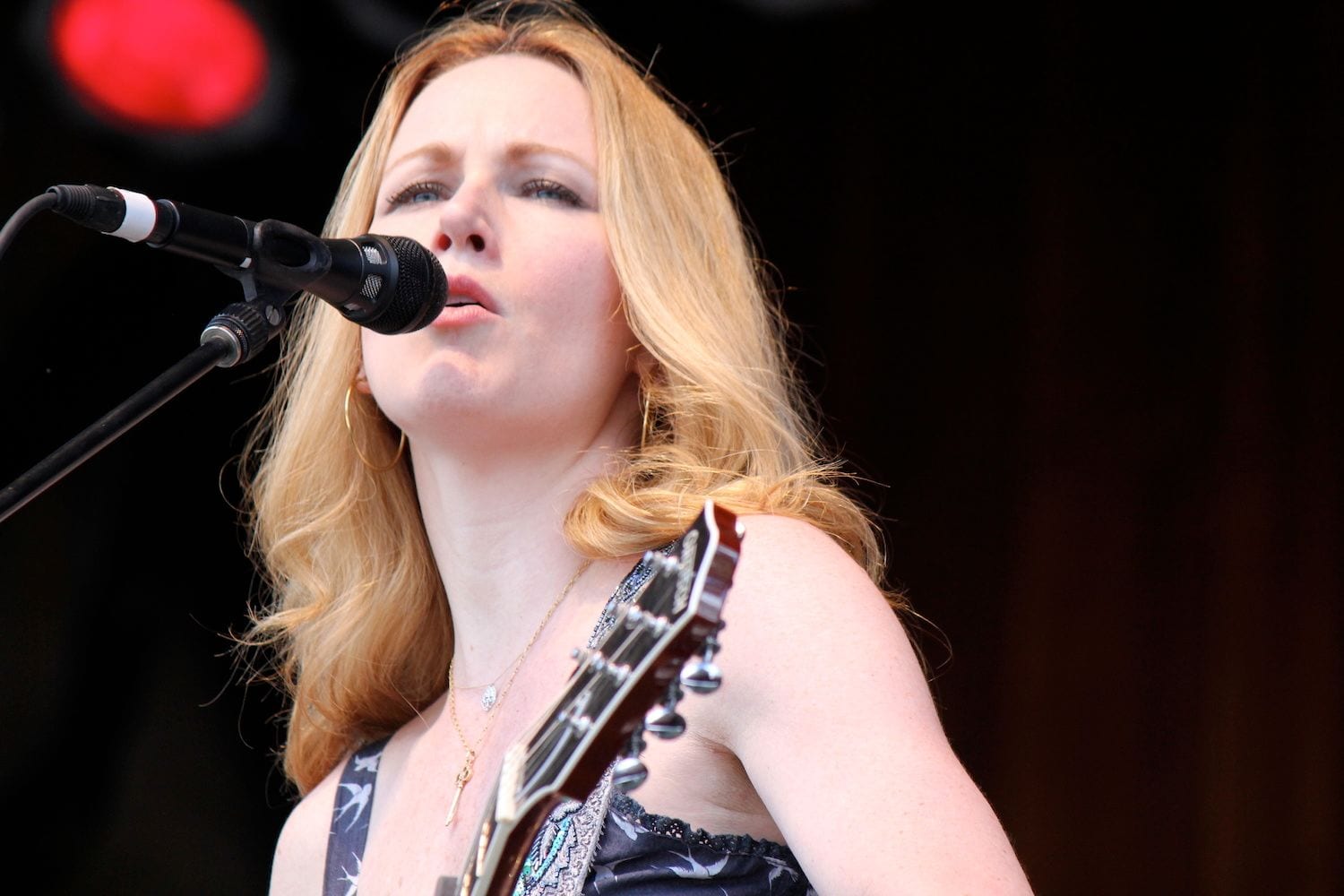

Allison Moorer might have thought The Hardest Part of reliving the horrifying moments of her parents’ deaths was over in 2000, when she included “Cold Cold Earth” as a hidden track on her second solo album.
Far from it, judging by the endless questions.
Nineteen years, three marriages and one son later, the stunning Oscar- and Grammy-nominated roots singer-songwriter has taken a profoundly deep leap into her past in small Alabama towns like Frankville, Chatom, Jackson, and Monroeville. Those places of Moorer’s youth are just part of the story that includes alarming truths, compelling details, uncompromising stances — and a few answers — about her childhood in an unforgettable two-for-one work of high artistic achievement.
The first is Blood, the ninth full-length solo studio album of Moorer’s illustrious career that serves as the debut for her own label (Autotelic Records). Released on 25 October, it connects the dots for two orphaned sisters and their relatives striving to survive while still trying to make sense of a senseless tragedy that happened 33 years ago.
The second is Blood: A Memoir, Moorer’s gripping book that came out yesterday through Da Capo Press. The brutally honest look at growing up in rural south Alabama with her older sister — acclaimed Grammy-winning artist Shelby Lynne, who writes the touching foreword — recalls happy times with Mama and frightening moments with Daddy in what should have been a peaceful, bucolic setting.
Their abusive, alcoholic father destroyed any lingering hopes for that blissful existence on 12 August 1986, when he shot and killed their mother, then himself, with a .30-06 Remington rifle outside the rental home in Tillmans Corner where his wife and two daughters had moved to get away from his cruelty. Allison, then 14 and sleeping in the living room, was awoken at around 5:00 am by the gunshots, and told to stay inside the house after Shelby, 17, emerged from her bedroom.
Shelby Lynne (left), Allison Moorer: Photo credit: Jacob Blickenstaff
In my third interview with Moorer (No Depression, 2010 and Huffington Post, 2015) when the expectant mother was less than three months away from giving birth to John Henry Earle, her son with second husband Steve Earle, she seemed relaxed, good-natured yet resolute about returning to her Nashville home. Back from a weeklong honeymoon with Texas singer-songwriter Hayes Carll following their May marriage and tending to Willie, her pup recently adopted from Tennessee Chihuahua Rescue, there was a busy schedule ahead that included a date at the Grand Ole Opry to kick off a series of book/record appearances.
A strong, smart, independent woman who sometimes keeps her emotions in check, Moorer initially sounded nonchalant when asked about performing some of the album’s tough subject matter.
“They’re just, you know, songs,” she said more than 20 minutes into the October 21 phone interview that covered both the book and album. “They’re important to me and I think they’re important to this book. But … as you know, I’ve never really dabbled in light fare, so …. (laughs) it’s not like, ‘Oh, God. I gotta get used to singing this heavy shit.’ No. I’ve been singing heavy shit for a long, long time.”
Moorer certainly has done a lot of heavy lifting during a career that began with an Academy Award best song nomination in 1999 for “A Soft Place to Fall” followed a year later by the musical statement of a lifetime in The Hardest Part‘s title cut: “The hardest part of living is loving / ‘Cause loving turns to leaving every time.”
That’s massive, but still falls short of the weighty lyrical-literary combination Moorer, 47, delivers here. Starting off with updates on John Henry, her special-needs nine-year-old “very handsome” son (“he’s growing like a weed”) who still attends school in New York and is currently staying with his dad, she humbly downplayed the tremendous significance of her dual effort.
Cowboy hat & lasso by jimo663 (Pixabay License / Pixabay)
Birth of a Book
“I’ve never been an artist who does something, releases it, then sits back and goes, ‘Oh, look at what I did.’ I’ve never done that,” said Moorer, one of my all-time favorite singers whose underrated songwriting deserves almost as much attention as her heavenly voice. “Not with records. I’ve always been one who … when I finish something, I am ready to go on to the next thing. … I was in such a specific emotional state when I wrote this book, and I finished it over two years ago.
“So now to go back to it when I’m halfway into my next book is a little bit of whiplash. You know, gives me a bit of emotional whiplash, if you will. I’m very proud that I wrote this book and told the story as well as I could tell it. It’s not perfect. Nothing is. But I know I did the best I could do. So I feel proud about that.”
Moorer, who earned a master’s degree in writing from NYC’s New School in 2017 after years of sacrificing aspects of a music career for a life with Earle and her son, playfully dodged questions about her next book, saying, “I’ll let you know when the time’s right. You journalists, always trying to find out something,” then got back to the difficulties of writing this first one.
“Well, I’m telling a harrowing story,” Moorer said. “And I know that. But the good news is I’m able to finally … look at it for what it is but also say, ‘You know, life is hard. And (sigh) marriage is hard. And parenthood is hard.’ And here are all the things that these two people were dealing with. And that’s not the set of circumstances I have or have ever had. But I have had a lot of experiences that I can relate to this situation that I was in.
“So being able to let my parents off the hook in a way — now I haven’t totally done it — because they could’ve done better. But maybe they didn’t have the knowledge. Maybe they didn’t have in their upbringings what they needed to bring to the table a healthy perspective. So I think it’s just important to remember those things. And that doesn’t mean that you can divorce yourself from your anger.”
At the very least, writing this memoir provided an outlet for any pent-up feelings. In the “Thank You” segment of the book, Moorer gives a shout-out to Anna deVries, now senior editor at St. Martin’s Press, for mentioning the book idea to her at a concert as far back as 2004, when their friendship was developing.
Allison Moorer performs at 2014 AmericanaFest in Nashville. Photo credit: Michael Bialas
“She was the very first person who suggested to me that I might have the talent to write,” Moorer said, “and we’re still great friends.”
That idea was enhanced in 2010 weeks after John Henry was born, and Moorer was invited to appear on Maya Angelou’s radio show. Moorer remembers their phone interview went something like this after she was asked about her childhood:
Moorer: “Yeah, you know, real rough. But I took all these things from it.”
Angelou: “Yeah, yeah, that’s great. But what are you gonna tell John Henry?”
Not knowing then that her son would later be diagnosed with autism, Moorer said, “It just stunned me. I went, ‘Oh my God. I don’t know.’ And that’s ironic because I didn’t know he’d end up being non-verbal. Now where he goes with that, we don’t know. But to date, he still has no spoken language. … And it just sent me on this course of thinking, ‘OK, yeah, this is something I should do.’ And it just happened. I mean, it was a lot of hard work.”
During a period of about five years that started in 2012, Moorer made tenacious efforts to fill in the blanks of some of her most traumatic moments, tracking down friends, relatives, family acquaintances and some of her dad’s coworkers.
More than 30 years after the murder-suicide, she inquired and received the death records of her parents — Laura Lynn Smith Moorer and Vernon Franklin Moorer. Depending occasionally on Shelby — they still call each other “Sissy” — for a memory check, “she would remember something one way and I’d remember it another.”
Also relying on what she called her active memory, Moorer looked through boxes of photos and letters to help stir the emotions.
“We think that we remember everything all the time,” she said. “But we actually don’t. And time changes memory. And you can’t always trust it. And it was difficult work. And there were times when I would just sort of be gripping the side of my desk, thinking, ‘How am I gonna write this down? It’s too painful.’ And trying to find the language to wrap around it when it’s not necessarily something you can put into words. It’s a feeling. So, you know, there were a lot of challenging moments like that. I did the best I could.”
Splitting the book into series of segments with titles like, “The ring on my little finger,” “Brown cowboy hat hanging on my closet door” and “Some of Mama’s made-up words,” Moorer was also able to share some sweet, tender and joyful moments in the memoir.Subscribing to Ernest Hemingway’s 500 words-a-day rule, Moorer lovingly wrote about Mama (and her creative use of language, like “smellance” for perfume), Sissy (who wanted Little Sissy to be her football tackling dummy) and their cattle dog, a blue heeler named Bullet, in Frankville, where the family foursome moved when Allison was about 17 months old.
“The thing about trauma is, and traumatic experience, is they’re the things that stick with you,” Moorer said. “And, you know, there’s a good reason for that. When we experience trauma, it implants itself into our brains and our bodies so that we know what to look out for next time. …
“There were good parts. And I have tried to take the gifts that came with all of the negative and make them into something, and be grateful for them. Because, the truth is, nobody has a perfect childhood. And nobody has perfect parents. And nobody’s ever going to. So I think the important thing to remember is: Let’s keep this in perspective. And even though people make bad choices, everyone’s worthy of understanding and empathy. And I hope that comes across in the book.”
Kenny Greenberg (left) and Allison Moorer perform 2014 AmericanaFest in Nashville. Photo credit: Michael Bialas
Family Reunion
Moorer, whose previous record was an intriguing collection of mostly covers for a 2017 duet project with her sister Shelby called Not Dark Yet, never considered making a companion album to the book until the idea was suggested by Traci Thomas, her manager.
Laughing about it now, even Moorer doesn’t know how she found the time to write more original songs to go with essential re-recorded versions of “Cold Cold Earth” and “Blood”, the title cut written for her sister that first appeared on 2015’s Down to Believing.
“I had a couple things lying around and then they just happened,” said Moorer, who supplied all the vocals and played acoustic guitar, piano and kick drum on the album. “The songs kept coming. When they do that, you gotta pay attention.”
She bookends Blood by dealing with depression in “Bad Weather”, scolding a “crazy girl” on Spotify for trying (unsuccessfully) to sound like Canadian songbird Kathleen Edwards, and ending with the positive vibes of “Heal”, cowritten with “great friend” Mary Gauthier (“I just think the world of her,” Moorer said).
One of the more fascinating aspects of the record is one of the ten songs Moorer didn’t write. Her father, once an aspiring musician and songwriter before giving up and struggling to find work elsewhere, left his unfinished handwritten lyrics to “I’m the One to Blame” in a briefcase that Lynne found shortly after their parents died. She wrote the music, and Moorer, relying only on her pristine vocals and acoustic guitar, recorded it for the album.
“I was very happy to get to include that,” Moorer said. “I think it’s an important part of the story and it’s … I wanted to make sure that I drew these characters and gave everyone a voice through song. And that was certainly the best way to do that for him. Just to let it be his voice.
“As soon as I decided to make the album, I thought, ‘Now is the time to do this. Now is the time to record this because the song’s been sitting around for a long time and it was something that Sissy and I had sung together.’ But neither of us had ever recorded it.”
While the nicest recollection of her father entailed in the book might involve a trip to Nashville to make a custom two-song record at Gene Breeden’s studio in 1985, Moorer’s precious memories of her beloved mother are numerous. But many of them were built around songs and her “beautiful” voice, too.
“She had a great ear,” Moorer said. “She could sing any harmony part. And she just was very natural and musical.”
Going into the vocal booth for the recording session, Shelby sang lead, accompanied by Allison (on high harmony) and Mama, but that wasn’t out of the ordinary for them because they were always harmonizing in the car on the way to and from school.
“It was just a very natural feeling. I think those car rides were very informative and educational for my sister and me. I think that’s where we did our 10,000 hours, actually,” Moorer said with a laugh while referring to Malcolm Gladwell’s somewhat contentious rule. “If you believe that, you know, it takes 10,000 hours of something to master something.”
At the age of eight, Moorer said she wrote her first song, called “Australia”. Her fascination with a faraway place developed after seeing a girl from Down Under whose grandmother was the principal of Moorer’s grade school in Chatom. Though Moorer never recorded it (“Why would I do that?” she asked, punctuated by a robust cackle) and didn’t write another song for 13 years, her connection to music was firmly implanted.
The Moorer female trio sang all kinds of songs in the car, but one of Mama’s favorites was the Kay Starr rendition of “Side by Side”. Listen for a couple of lovely verses of the classic standard near the end of “Blood” by Moorer, who also pays reverential homage with “The Rock and the Hill”.
The album’s vibrant rocker was written from the point of view of her mother:
Standing with my babies in the chicken pen / Watching over like a nervous mother hen / God’ll hear my prayer but I don’t know when
“I love that song. I was so happy to get that down because I think it really shines a light on how hard my mother’s life was. And how it, you know, it didn’t have to be,” Moorer said. “And she was in a situation that she didn’t really know how to deal with. And it was frustrating to her. And it’s also for all women who are trying to do a lot with a little. Like she was the queen of that.”
Revisiting a Song
Nine years ago, a decade after “Cold Cold Earth” was initially released, Moorer addressed in our first interview how she and her sister learned to adapt after their parents’ deaths.
“I’m very lucky that way in that I’ve never felt like I was going off the deep end or whatever,” she concluded in 2010. “But having said that, those experiences have definitely shaped my filter.”
Now they are lying / In the cold, cold earth / Such a sad, sad story / Such a sad, sad world
For me, the closing lyrics to “Cold Cold Earth” are haunting and still impossible to forget, ever since hearing Moorer sing them at a 2000 show on a snowy November night in Denver, where I first met her a little more than a month after The Hardest Part was released. The “concept” album that Moorer cowrote with first husband Doyle “Butch” Primm (and was co-produced by the pair and Kenny Greenberg), was inspired, she has said, by the true story of her parents’ relationship, one that was inevitably doomed.
It makes perfect sense that “Cold Cold Earth” was re-recorded for Blood, which reunites Moorer with multi-instrumentalist/producer Greenberg, who also teamed up for Down to Believing.
“I had written the song in the back of a notebook and my husband at the time found it because I guess he was going through my things,” she said. “And he asked me about it, and I sort of sheepishly played it for him and he said, ‘You should probably put that on a record.'”
After Greenberg agreed “Cold Cold Earth” belonged on The Hardest Part, Moorer said, “I ended up making it a hidden track because I just wasn’t ready to (pause) let that out in such a bare way. …
“I think it was important for me to do it,” she added. “And, you know, I misguidedly thought that it would answer the questions that everybody seemed to want the answers to. But they didn’t.”
The questions will undoubtedly persist, as Moorer’s upcoming appearances will often include her songs, a guest moderator, an audience Q&A and book signings.
Allison Moorer performs at the 2011 Telluride Bluegrass Festival. Photo credit: Michael Bialas
And the “Wickedest Place on Earth”
In early 2016, after celebrating Carll’s 40th birthday in New Orleans, the couple headed to Alabama on the way to Florida for the 30A Songwriters Festival.
While visiting her relatives in Baldwin County, the trip included about an hour’s stay at Moorer’s childhood home in Frankville, where there once was a barn with cows and chickens and a pond stocked with bream that Shelby and Allison caught with their cane fishing poles.
“I’m not sure I’d have ever gone to Frankville again without being nudged by someone who can nudge me,” wrote Moorer of Carll, who called the place “beautiful.”
“I agreed and added that it had also been the saddest, ghastliest, wickedest place on earth,” Moorer said.
Asked to sum up her visit for this interview, Moorer said, “It was an experience of going to a place that had been abandoned for many years. And some things about it were the way I remembered and some things weren’t. You know, there’s a lot of memory there, a lot of traumatic memory there, a lot of sweet memory there. It’s where I spent the first years of my life. But there’s no one there now and no need for me to go back.”
Moorer insisted she has no plans to return to Franklin and understandably has no desire to ever visit Tillmans Corner or the rental house on Barden Avenue where the tragedy occurred.
Yet the disturbing memories will forever remain.
When Moorer plays the Cedar Street Social Club in Mobile on 7 November (joined by Carll as moderator), it will be her first appearance in Alabama’s popular Gulf Coast city since she and her sister played the Saenger Theater in 2010. Tillmans Corner is only an 11-mile drive away on Interstate 10.
Asked what she expects that show to be like, Moorer said impassively, without any inflection or sense of irony in her response, “I’m sure it will be off the hook. Trying to get prepared for everybody being there and, you know, I think probably almost everyone that comes to that show will have some sort of personal connection to the story. So that might be quite heavy.”
Yet the unflappable, determined, ambitious and accomplished Moorer might be fully prepared to show another side, admitting that “Nightlight”, a tender ballad from Blood about her sister (You’re my first light last light / You’re my daylight you’re my moonlight), hasn’t been easy to perform live.
“I have a really hard time talking about her in this process,” Moorer said of Lynne, who was the victim of much of her father’s physical brutality. “In the book and … I have a hard time singing that song because I feel very protective of her and, you know, it’s emotional.”
Moorer, who ultimately forgives her father in Blood: A Memoir, also revealed what she has learned about herself while writing the book.
“I learned that (pause) I’m very soft,” said Moorer, seeming to choose her words carefully. “I have a very soft heart and center. And that’s not necessarily something I let show. But I am (pause), I’m affected by a lot. And I’m a very capable person. … At my core, I’m really vulnerable and soft. And that’s a gift, too.”
With so many answers finally delivered, there should be no question about that now.







![Call for Papers: All Things Reconsidered [MUSIC] May-August 2024](https://www.popmatters.com/wp-content/uploads/2024/04/all-things-reconsidered-call-music-may-2024-720x380.jpg)



